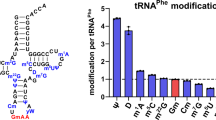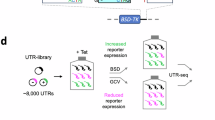Abstract
Standard microarrays measure mRNA abundance, not mRNA synthesis, and therefore cannot identify the mechanisms that regulate gene expression. We have developed a method to overcome this limitation by using the salvage enzyme uracil phosphoribosyltransferase (UPRT) from the protozoan Toxoplasma gondii. T. gondii UPRT has been well characterized because of its application in monitoring parasite growth: mammals lack this enzyme activity and thus only the parasite incorporates 3H-uracil into its nucleic acids1,2. In this study we used RNA labeling by UPRT to determine the roles of mRNA synthesis and decay in the control of gene expression during T. gondii asexual development. We also used this approach to specifically label parasite RNA during a mouse infection and to incorporate thio-substituted uridines into the RNA of human cells engineered to express T. gondii UPRT, indicating that engineered UPRT expression will allow cell-specific analysis of gene expression in organisms other than T. gondii.
This is a preview of subscription content, access via your institution
Access options
Subscribe to this journal
Receive 12 print issues and online access
$209.00 per year
only $17.42 per issue
Buy this article
- Purchase on SpringerLink
- Instant access to full article PDF
Prices may be subject to local taxes which are calculated during checkout




Similar content being viewed by others
References
Pfefferkorn, E.R. & Pfefferkorn, L.C. Specific labeling of intracellular Toxoplasma gondii with uracil. J. Protozool. 24, 449–453 (1977).
Schumacher, M.A. et al. The structural mechanism of GTP stabilized oligomerization and catalytic activation of the Toxoplasma gondii uracil phosphoribosyltransferase. Proc. Natl. Acad. Sci. USA 99, 78–83 (2002).
Iltzsch, M.H. & Tankersley, K.O. Structure-activity relationship of ligands of uracil phosphoribosyltransferase from Toxoplasma gondii. Biochem. Pharmacol. 48, 781–792 (1994).
Dubey, J.P. Toxoplasmosis. J. Am. Vet. Med. Assoc. 205, 1593–1598 (1994).
Cleary, M.D., Singh, U., Blader, I.J., Brewer, J.L. & Boothroyd, J.C. Toxoplasma gondii asexual development: identification of developmentally regulated genes and distinct patterns of gene expression. Eukaryot. Cell 1, 329–340 (2002).
Lekutis, C., Ferguson, D.J., Grigg, M.E., Camps, M. & Boothroyd, J.C. Surface antigens of Toxoplasma gondii: variations on a theme. Int. J. Parasitol. 31, 1285–1292 (2001).
Aliberti, J. et al. Molecular mimicry of a CCR5 binding-domain in the microbial activation of dendritic cells. Nat. Immunol. 4, 485–490 (2003).
Raghavan, A. et al. Genome-wide analysis of mRNA decay in resting and activated primary human T lymphocytes. Nucleic Acids Res. 30, 5529–5538 (2002).
Wang, Y. et al. Precision and functional specificity in mRNA decay. Proc. Natl. Acad. Sci. USA 99, 5860–5865 (2002).
Ross, J. mRNA stability in mammalian cells. Microbiol. Rev. 59, 423–450 (1995).
Yu, Y.T. & Steitz, J.A. Site-specific crosslinking of mammalian U11 and u6atac to the 5′ splice site of an AT-AC intron. Proc. Natl. Acad. Sci. USA 94, 6030–6035 (1997).
Singh, U., Brewer, J.L. & Boothroyd, J.C. Genetic analysis of tachyzoite to bradyzoite differentiation mutants in Toxoplasma gondii reveals a hierarchy of gene induction. Mol. Microbiol. 44, 721–733 (2002).
Sibley, L.D., LeBlanc, A.J., Pfefferkorn, E.R. & Boothroyd, J.C. Generation of a restriction fragment length polymorphism linkage map for Toxoplasma gondii. Genetics 132, 1003–1015 (1992).
Bohne, W. et al. Targeted disruption of the bradyzoite-specific gene BAG1 does not prevent tissue cyst formation in Toxoplasma gondii. Mol. Biochem. Parasitol. 92, 291–301 (1998).
Carninci, P. et al. Normalization and subtraction of cap-trapper-selected cDNAs to prepare full-length cDNA libraries for rapid discovery of new genes. Genome Res. 10, 1617–1630 (2000).
Ajioka, J.W. et al. Gene discovery by EST sequencing in Toxoplasma gondii reveals sequences restricted to the Apicomplexa. Genome Res. 8, 18–28 (1998).
Acknowledgements
We thank Edward Mocarski, James McCloskey, Dan Herschlag and members of the Boothroyd lab for helpful discussions. Jon Boyle provided the S23 parasite strain and technical assistance with the mouse infection experiments. M.D.C. was supported by the National Institutes of Health (NIH) (CMB GM07276) and the University of California University-wide AIDS Research Program (D02-ST-405). C.D.M. was supported by the NIH (5T32AI07328 and 1F32AI056959). E.J. was supported by the Damon Runyon Cancer Research Foundation (DRG-1630). R.G. was supported by the NIH (GM29812). J.C.B. was supported by the NIH (AI41014 and AI21423).
Author information
Authors and Affiliations
Corresponding author
Ethics declarations
Competing interests
A patent application relating to this work has been filed.
Supplementary information
Supplementary Fig. 1
Identification of 4-thiouridine in purified sU-labeled mRNA. (PDF 132 kb)
Supplementary Fig. 2
Normalization of pulse-chase microarrays (PDF 154 kb)
Rights and permissions
About this article
Cite this article
Cleary, M., Meiering, C., Jan, E. et al. Biosynthetic labeling of RNA with uracil phosphoribosyltransferase allows cell-specific microarray analysis of mRNA synthesis and decay. Nat Biotechnol 23, 232–237 (2005). https://doi.org/10.1038/nbt1061
Received:
Accepted:
Published:
Issue Date:
DOI: https://doi.org/10.1038/nbt1061



